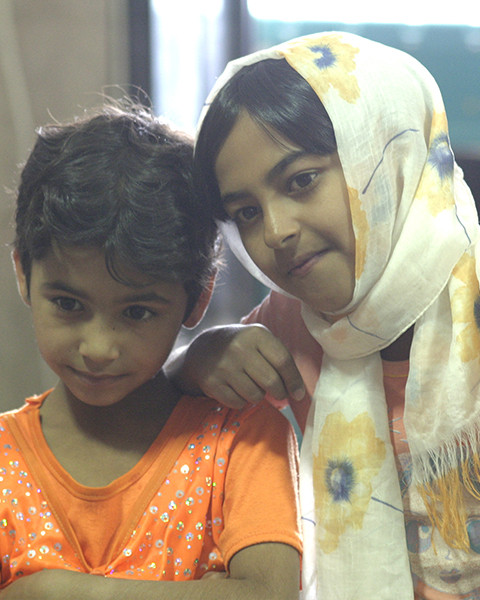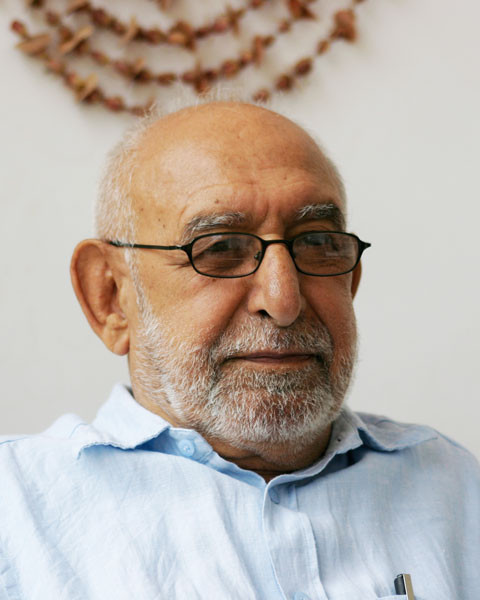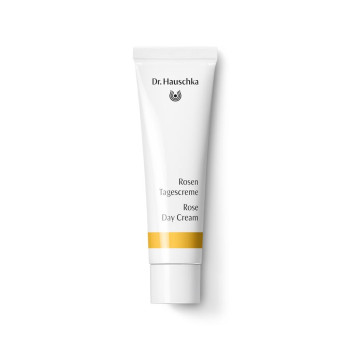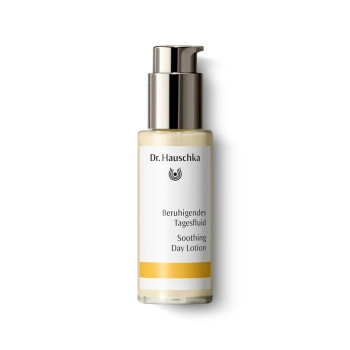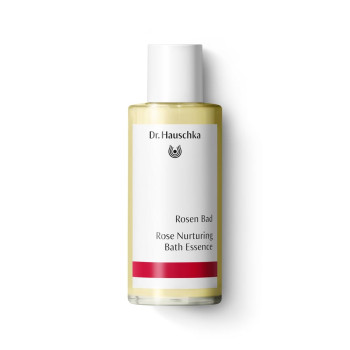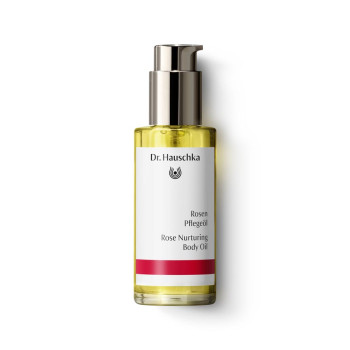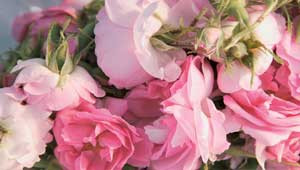The Scent of Roses in the Desert
There is a scent of roses in the air. Hans Supenkämper walks with Mahdi Maazolahi between the tall willow trees silhouetted against the brilliant blue sky and the building containing the distillery to the place where the compost is maturing. The 4000-metre high mountains in the distance are still covered in snow but the two men, so different from each other, are already beginning to feel the heat of this May day. The agriculturist Hans Supenkämper, a tall, sturdy man with gentle eyes, is a WALA consultant on biodynamic agriculture who advises farmers in Iran. Today he is visiting the fields of the mountain village Mehdi Abad with the agricultural adviser of the Zahra Rosewater Company, Mahdi Maazolahi, to appraise the compost started the previous autumn.
Pistachio Shells to Compost
Mahdi Maazolahi, a small man with thick dark hair and a round face, is never still. He moves deftly beside the tall German, who is wearing his trade-mark light brown hat with the cord. Hans Supenkämper is satisfied. The pistachio shells have completely decomposed, the resulting soil resembles fine crumbs, not too dry and not too moist and with a pleasant smell. Carefully he re-covers the compost heap with a tarpaulin to prevent too much evaporation in this desert-like region. By some kind of wonder a profusion of roses is thriving in a landscape characterized by a lack of water. Few trees and only a little greenery cover the hard ground of the lonely mountain region. An audible silence surrounds the women flower-pickers who are quietly harvesting the fresh Damascene rose blooms in the neighbouring field. They have bags slung around their hips, into which they put the flowers they have collected. When the bag is full they shake the flowers out into bigger sacks that their menfolk then carry to the distillery. With their colourful dresses and headscarves they stand out among the pinkly blossoming rose bushes.
The fields in Mehdi Abad are trial fields belonging to the Iranian firm Zahra Rosewater Company which, with WALA’s support, is working them biodynamically. Zahra gets most of its rose essential oil and rose water from the Lalehzar valley which lies in the centre of Iran at about 2200 metres above sea-level. The 83-year-old founder of Zahra Rosewater, Homayoun Sanati, loves to tell how he and his wife were surprised by the intensive taste of the mint when they went for a meal in the Lalehzar valley. It seemed an obvious idea to cultivate roses on the land inherited from his father Abdul-Hossein Sanati. Today 1500 farmers collaborate with the Zahra Rosewater Company, 50 percent of which belongs to the Sanati Foundation, an institution founded by Homayoun Sanati’s grandfather.
Tracking Down Europe’s Secret
Haj Ali Akbar Sanati (1858–1938), a knowledge-hungry trader from the Iranian desert town of Kerman, was looking for an answer to the question of what made Europe so successful. Around 1901 he set off on foot to find it. His path led him via India and the Ottoman Empire to Vienna. He was gone for ten years before returning to Kerman by way of Russia and Central Asia. With him he brought the answer to his quest: education and industry were the secret he had been searching for. So in his home town Kerman, until then a quiet backwater, he founded a textile industry as well as an orphanage that gave children not only shelter but also an upbringing and instruction, including instruction in industrial work. He took for himself the name Sanati, which is Persian Farsi and means ‘industrial’. At that time family names were unknown in Iran. Many of the orphans chose to take the name Sanati, however. In the early 1960s Homayoun Sanati’s father established a museum of modern art and a library on the site of the orphanage. They are still there today.
Children Are Our Future
"We must teach the children to think, not just the rote learning taught in state schools.“ Homayoun Sanati’s eyes are fiery when he speaks of his latest project. In 1974, after the death of his father, he took over the management of the orphanage, among other things. Since taking on Ali Mostafavi, a professor of chemistry, as general manager of Zahra Rosewater in 2006 he devotes more time to the orphanages of the Sanati Foundation. In addition to the boys’ orphanage in Kerman there is one for girls in Bam, a town severely damaged by a violent earthquake; a kindergarten for disabled children in Kerman and a home for mentally retarded girls, who are often the targets of violence or abuse in the family. A total of 200 children find shelter and protection in the Foundation’s institutions. For Homayoun Sanati children represent the future of Iran. „We must educate the mothers“, he adds in a determined voice. For it is they who equip the children with a knowledge of ethics and social conduct to accompany them on their path through life.
Rose Months
Around the distillery in Lalehzar it is busy as a hive of bees in the months of May and June. On mopeds, donkeys, lorries and tractors or even on foot the farmers of the surrounding areas hurry to deliver their freshly harvested roses. At the entrance to the warehouse, where the air is pregnant with the scent of the roses spread on the ground, a distillery employee sits beside a large set of scales. He weighs every sackful of roses precisely, enters the weight in a receipt book and gives the farmer a receipt which he can take to be paid directly afterwards. "The price we pay is good, and we want the farmers to know that”, says Ali Mostafavi, general manager of Zahra Rosewater. At the end of the year Zahra also pays bonuses to their contract growers if the turnover is high enough. "Of course we also have to invest in the business“, says Mostafavi with his gentle smile. For example, a new bottling line is needed for the approximately 20 different plant distillates, from peppermint water and willow water to the forty-herb water, that Zahra produces in addition to its essential oils, herbal salts and fruit teas. With this broad range of products Zahra can continue to utilise the distillery once the short rose season has finished.
Rose Oil and Rose Water
In the rose delivery hall everything happens very quickly. In the background employees take charge of the sacks and empty the roses on to the clean floor of the hall. The flowers must not be allowed to get hot, otherwise they would lose too much of the costly rose essential oil. For this reason harvesting starts early in the morning and everyone in the Lalehzar valley who is not aged or infirm is roped in to help. Again and again the distillery workers turn the roses over to ensure that they remain cool. When stills in the neighbouring hall become free the flowers are hastily taken over and wrapped in blue tarpaulins to be heaved up into the upper vessel of the distilling apparatus. The vessels can hold 500 kilograms of rose flowers which boil for three hours with around 500 litres of water. Zahra Rosewater processes more than 900 tons of rose flowers each year. This work yields a precious 900 tons of rose water and about 150 litres of rose flower oil which are constantly analysed for quality in their own laboratory. "Our aim is to increase the yield to 1100 tons of rose flowers per year,” says Ali Mostafavi. The long-term contract of cooperation with WALA to purchase more than a third of the rose oil produced as well as dried rose blossoms makes him optimistic, e.g. for Dr. Hauschka Rose Nurturing Body Oil. New fields in Shiraz and Dharab will contribute to this growth. Mostafavi is pleased with the good business relations with WALA. In January 2008 he paid a visit to the German company to discuss a joint quality standard, among other things.
Education and Training
The 1500 farmers who work for Zahra Rosewater are independent entrepreneurs. In contracts concluded with Zahra they undertake not to use chemical fertilisers now that Zahra has the fields certified as organic by the British Soil Association. "It is a challenge to stop the farmers treating the roses with chemical agents,” says Mostafavi, “because the Iranian government subsidises chemical fertilizers and initially these are the only ones the farmers are familiar with.” Education and training, for example by WALA’s agriculturist Hans Supenkämper, who works following biodynamic principles, are therefore important pillars of the collaboration with these farmers. Apart from this, Zahra provides the farmers not only with rose cuttings but also with free natural fertilisers from compost. Anyone violating the prohibition on chemical fertilisers is excluded from the contract for four years. "But we don’t leave the farmers on their own in this situation,” Hamayoun Sanati tells us. His vision is to convert the whole Lalehzar valley to organic agriculture, from dairy cows and roses to fruit and vegetables. If a farmer did use chemical fertilizers he would be reported, but Zahra would still take his roses – albeit at a lower price – and would have them distilled in conventional distilleries. Anyone working with Zahra is family. This attitude is reinforced by a regular newspaper for the farmers in Lalehzar supervised by Mahdi Maazolahi. It reports on events covering all aspects of roses and rose-growing, publishes portraits of individual farmers, announces festivals and news from the villages and includes special pages for the women and children. As part of this family-oriented collaboration, families in need are granted an advance on their income, older people no longer able to work receive a kind of pension and legal aid is provided in cases of dispute. Zahra has improved the water supply to the villages and supports the schools. A local health centre set up by Zahra guarantees primary health care. Anyone needing to visit a specialist in Kerman is helped with transport. Anyone wishing to marry is given a credit at the very low rate of interest of 4 percent instead of the 14 percent charged by the Iranian banks. Zahra makes it possible for specially gifted children to attend school in Kerman. The hope is that they will return to their villages with a good education and work there. The idea is working: Lalehzar has the lowest unemployment rate in the whole region. Migration from the countryside to the towns – widespread elsewhere in Iran because middlemen mean that agriculture is scarcely financially viable any longer – is nearly unknown here. Even the Iranian Ministry of Agriculture views the enterprise benevolently and offered Zahra credit to continue expanding. However, this was not necessary because Zahra is well able to finance itself and can even donate part of its profits to the orphanages of the Sanati Foundation.
"We are planting wheat in trial fields with and without chemical fertilisers and then comparing both yield and costs,” says Ali Mostafavi. He passes the results on to the farmers, who are capable of deciding for themselves whether organic farming is a viable option. It is hoped that the farmers will develop a feeling for organic farming and pursue it out of their own conviction. Even if in Iran itself there is no market for organic products as yet, except for occasional pockets in Teheran, Zahra Rosewater believes in its organic Velvet Revolution.
The Beginnings
The cooing of the doves fills the inner courtyard of the ochre-coloured brick building constructed by grandfather Sanati in Kerman. Today it houses the headquarters of the Zahra Rosewater Company and is home to Homayoun Sanati. Its walls keep out the hubbub of Kerman, now a city of a million people, and it is a good place to ponder on the origins of Zahra.
After Homayoun Sanati and his wife decided to cultivate roses in Lalehzar they acquired Damask rose cuttings from the traditional Iranian rose-growing region Kashan in the province of Isfahan. The first trials were overwhelming. After just eighteen months the bushy rose trees were yielding blooms with a 50 percent higher oil content than roses from Kashan. This led the Sanatis to plant a 20-hectare rose field, although the farmers of the region were very suspicious of this new cultivation. Then the Iranian revolution happened. When Khomeini came to power Homayoun Sanati was arrested. He was accused of being a CIA agent because he worked for the American publishing company Franklin. Actually, his only job there was to translate English-language fiction and text books and publish them in the Iranian language Farsi. But the mere fact that he had published 1500 books was regarded as a crime against Islam, because he was said to have subverted the culture of Islam by publicising American ideas. After eight months in solitary confinement in a damp cell with no light he was forced to spend a further five years in prison. He was released in 1983. In the meantime his wife was left alone to look after the roses, which were like children to her. So it was even more terrible for her to have to look on as the farmers in Lalehzar stopped watering the young plants every 14 days and watered them just once over the whole summer. But then a miracle happened. The roses continued to grow, be green and bloom abundantly. The farmers were so impressed that from then on they began to believe in growing roses: they could see that with little work and a minimum of water they produced a far better harvest than wheat or potatoes or even the opium poppies which they had long been growing illegally to stretch their meagre income. "So my time in prison did have one positive outcome“, grins Homayoun Sanati with boyish charm. Following his grandfather’s advice: "Never be afraid of fear", he was able to survive his time in prison. During his time in solitary confinement he even composed hundreds of verses about the rose, all of which he kept in his head and only wrote down after his liberation. "Our difficulties are our greatest treasures“, he concludes.
Further information:
A selection of Dr. Hauschka products that contain valuable essential rose oil


